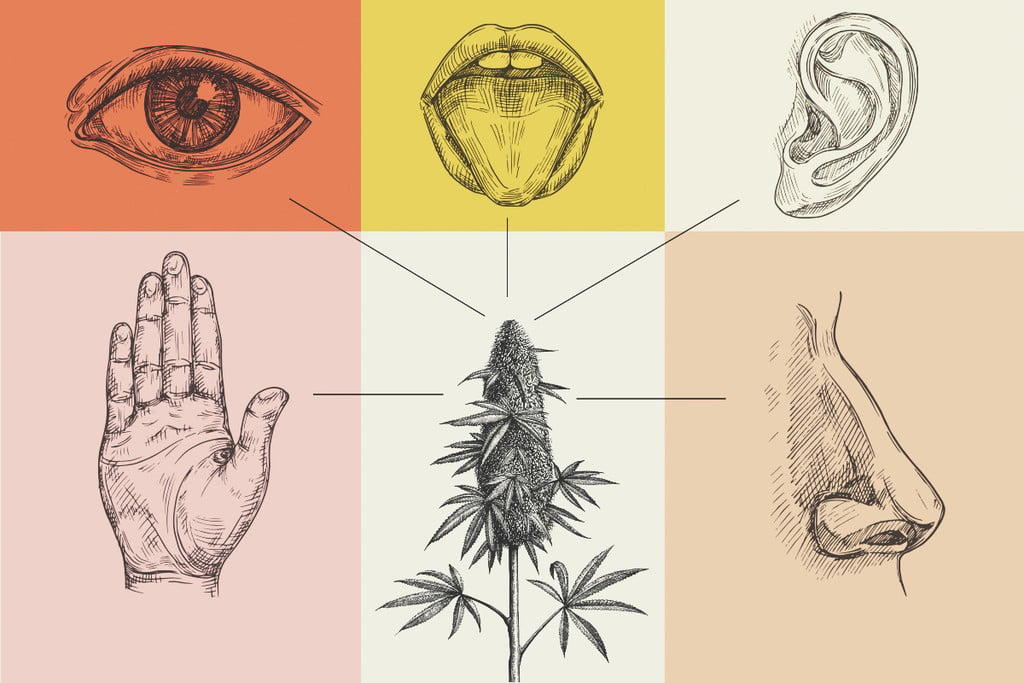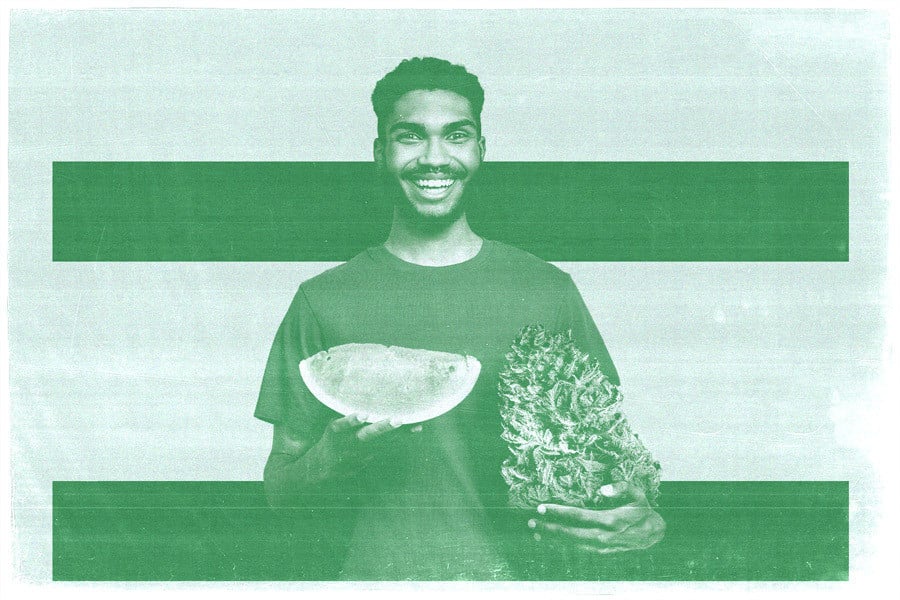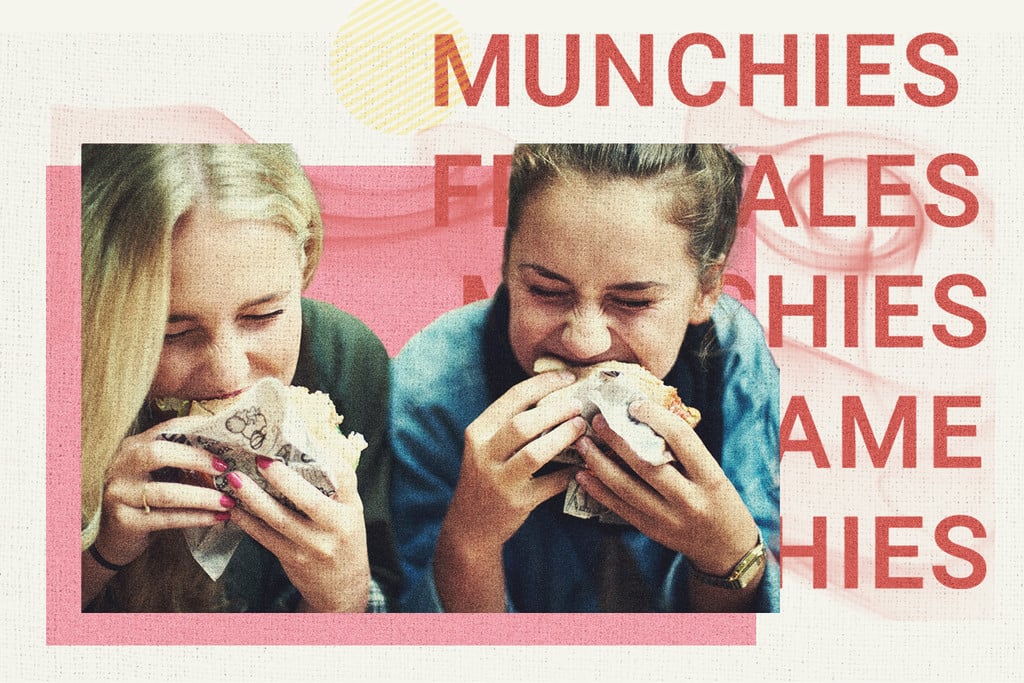.
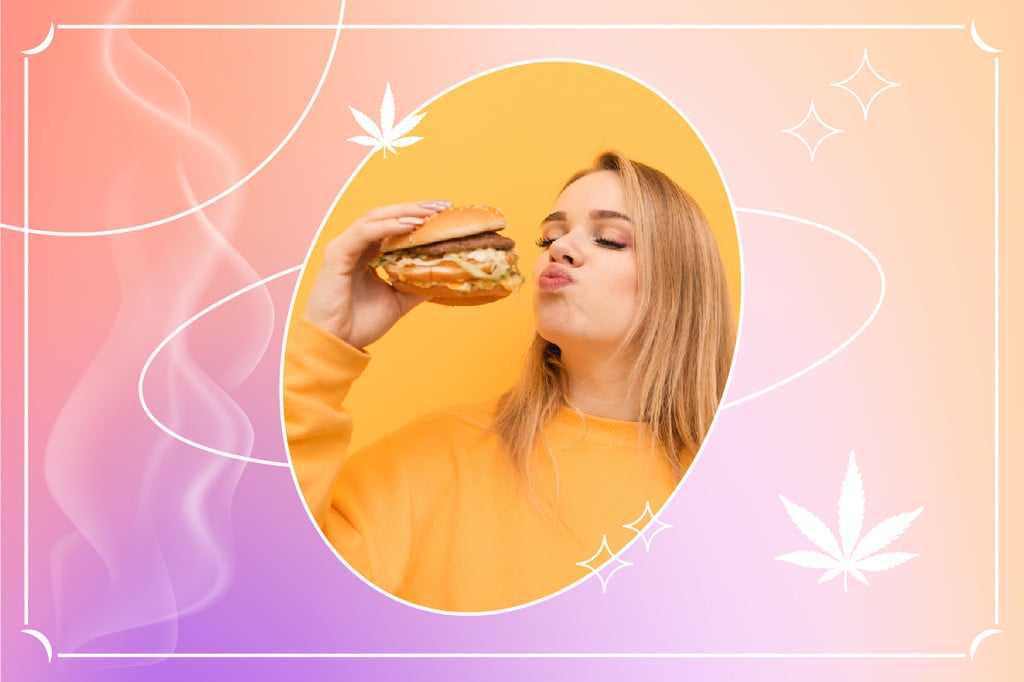
Why Does Food Taste Better High?
If you've ever smoked weed, you've probably had the munchies. What exactly is going on, though? Why does everything suddenly taste so much better when stoned? And why can't you resist having just a couple more (packets of) biscuits? Join us as we unravel the mystery of the munchies.
Contents:
That sudden urge to eat everything in the fridge is one of the more enjoyable side effects of weed that everyone experiences from time to time. As well as wanting to eat more, you may also crave strange combinations of food that you would otherwise never consider.
However, have you ever wondered why we get the munchies? Or, more generally, why food tastes so great while high? Let's try to unravel the mystery of the munchies, and find out why peanut butter on roast potatoes may, sometimes, seem like the best idea ever!
What Is Taste?
Taste is one of the five senses, along with sight, smell, hearing, and touch. It is the sensation we experience when food passes over our taste buds. The taste buds then transmit a message to the brain to communicate whether the food item is sweet or sour or salty. However, that is not the whole picture. Taste is as much to do with our experiences and influences as it is to do with our physical taste buds. Whether something is considered delicious or unappetising is both intrinsic and learned.
How Do We Taste?
Food enters your mouth, is chewed, and introduced to saliva, which uses enzymes to break it down. The food then passes over your papillae. These are the thousands of bumps that cover your tongue. Each papilla contains 50 to 100 taste cells that form taste buds.
Your taste buds have receptors tuned to the five basic tastes. These are bitter, sweet, sour, salty, and umami. Umami is a Japanese word describing savoury flavors like roasted meat and soy sauce.
The five tastes help our brain determine whether the food is safe to go any further. If the brain registers the taste as sweet or savoury, it identifies it as a viable source of nutrients. If it is bitter or sour, it could recognize the taste as a possible toxin.
However, the taste buds cannot understand the complexity of many flavors alone. We must factor in our sense of smell too. As you chew your food, a small amount of air rises through passages at the back of the throat. The nasal cavity's receptors can then detect the scents that make up rich, layered flavors.
This process is not the same as merely "smelling" your food. Your brain can distinguish whether the smell comes from your nostrils or your mouth. When it originates from your mouth, it groups the signal in with the signals from the taste buds. This process is called "retro nasal olfaction", a hybrid sense that we know as "flavor".
Taste receptors can be found all over the body, even lining the small intestine. When these receptors detect sugar, they activate hormones that release extra insulin into the bloodstream.
Why Are Some Foods Delicious?
The reason we prefer some foods to others boils down to mere evolution and the idea that, if Mom ate it, it must be safe. Even as babies, our mothers' choices may influence the food we enjoy later. For example, babies whose mothers eat a lot of garlic will be able to taste and enjoy the garlic flavor in breast milk.
Our food preferences are established over our entire lives, by many factors. Even our environment sends cues about how our food should taste. Endless food-marketing campaigns condition us. Even visual and auditory triggers can impact how tasty we find something. For instance, tests have shown that people eat less food from a blue plate. A chunk of cheese with clean edges tastes sharper than one with rounded corners. Potato chips taste better the crunchier they are.
Taste is both a mental construct and a chemical one. Whether or not we find something delicious depends on many variables; our family, our experiences, the environment we are eating in, and who we are eating with.
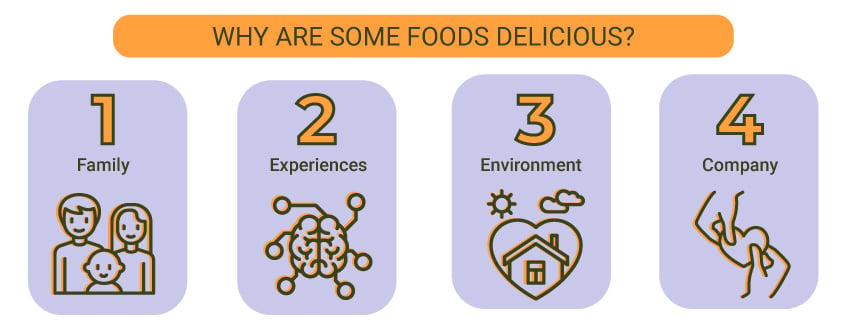
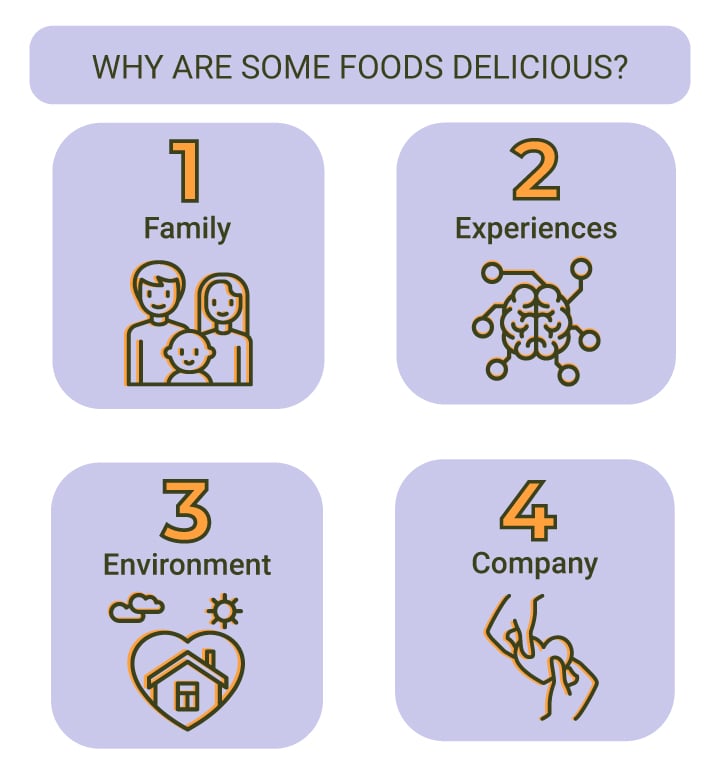
Why Does Food Taste Better When You're High?
The cannabinoid that gets us high is the same cannabinoid that increases food cravings—THC. Research has shown that THC stimulates the endocannabinoid system and receptors in our brain that regulate emotion, pain, smell, and taste—specifically CB1. It can also stimulate the release of the hormone ghrelin, which promotes hunger. But when it comes to determining why THC makes food taste better, there are numerous facets to consider.
Does Weed Heighten Your Senses?
According to a 2014 animal study, THC may enhance our sensitivity to smell by attaching to receptors in the brain's olfactory bulb. This makes aromas from food more attractive and, in turn, makes you want to eat more.
Other research claims that the activity of neurons that promote satiety (fullness) actually increases when the CB1 receptor is activated, leading to a “paradoxical” effect that “may be driven by both pre- and post-synaptic effects”. In other words, it may be that the unique, disparate effects exhibited by THC and other CB1 agonists are together responsible for increasing pleasure from feeding, not just one single mechanism of action.
Then there is dopamine, a chemical that controls the body's feelings of reward and pleasure. As acute THC use increases the release of dopamine, this can enhance the enjoyment of eating and lower inhibitions, in turn making you more likely to indulge.
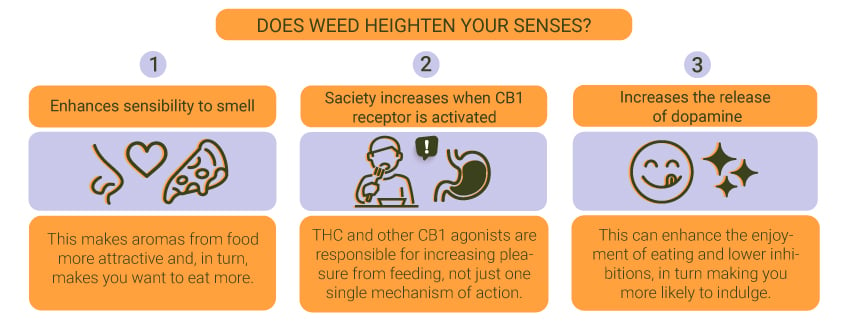
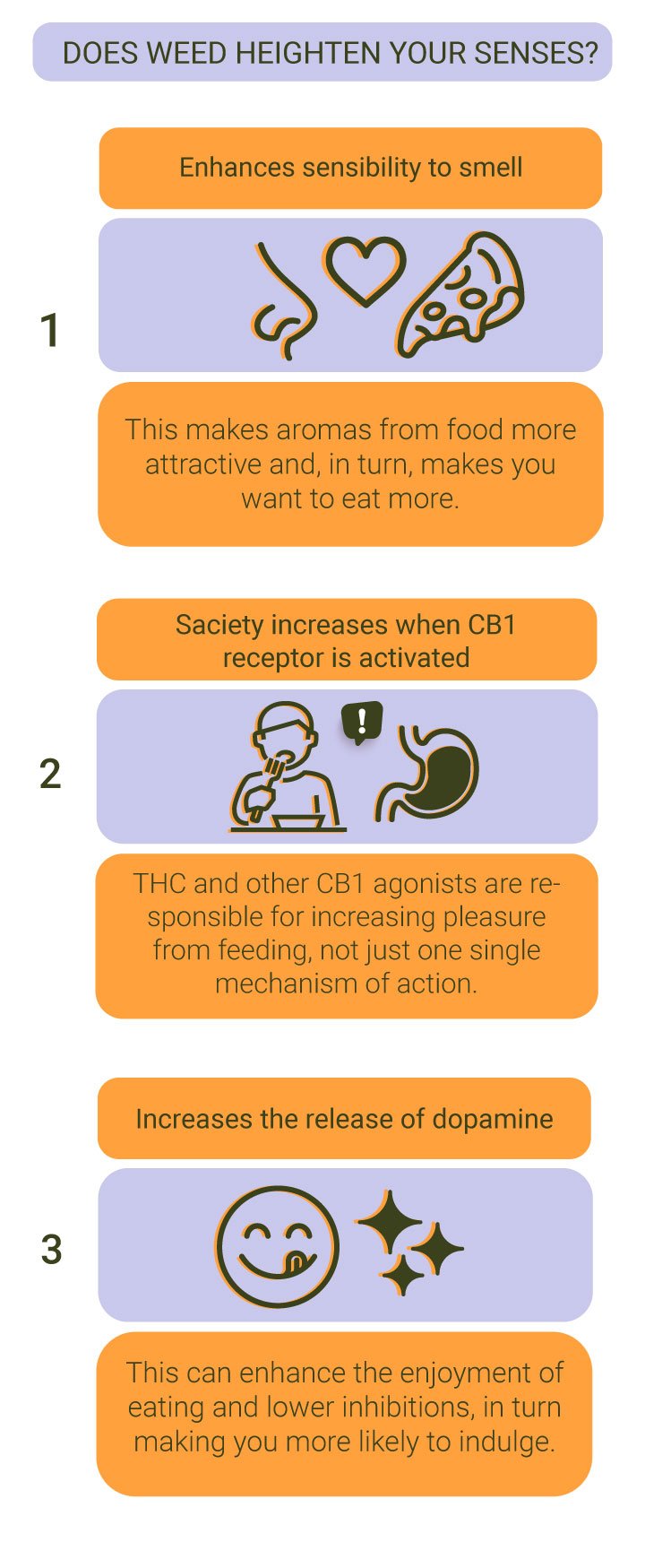
What Does Eating Weed Do to Your Body?
But what about eating cannabis-infused food? When you ingest cannabis edibles, the THC makes its way through the GI tract before being converted by the liver into a cannabinoid with even greater psychoactive effects—and a greater chance of inspiring a bad case of the munchies. This cannabinoid, known as 11-hydroxy-THC, also results in a much longer-lasting high. So while edibles are a good way to bypass smoking and vaping, not only do they involve the ingestion of calories outright, but they can deepen and prolong your desire to eat once you’re stoned.
Of course, there are ways to mitigate the amount you ingest, starting with choosing low-calorie edibles. For example, consider taking individual gummies as opposed to eating a whole brownie. And when the high does hit, some self-control and management techniques, such as regularly drinking water and keeping busy, can help to keep you out of the fridge.
Can You Prevent the Munchies?
Some years ago, researchers believed that if the munchies were induced by the effect of THC on CB1 receptors, then it must be possible to create a drug that could block this effect. Indeed, a drug called rimonabant was released and, at first, found to be successful in stopping cravings for fatty foods and nicotine and alcohol.
However, it soon became apparent that you cannot block endocannabinoid receptors that control mood and appetite without serious consequences. Some people taking rimonabant began to suffer from severe depression, and a few even committed suicide.
The results of trials revealed that it is impossible to intercept some endocannabinoid receptors and not others. The bliss we experience when eating something delicious is too intrinsically entangled with the rest of our endocannabinoid system. So, if you try blocking part of the system, you will end up blocking all of it, removing the capacity to feel happiness.
Can THCV Stop You From Getting the Munchies?
THCV, or tetrahydrocannabivarin, is an inverse agonist/selective agonist of CB1, which gives it a unique profile to THC. With this in mind, THCV has been studied for its potential to decrease appetite, increase satiety, and upregulate energy metabolism in rodents. According to various preliminary studies, THCV, at certain doses, appears to suppress cravings instead of encourage them.
However, THCV is a minor cannabinoid, and only a few specific strains contain concentrations over 1%. It is found in the highest quantities naturally in African landrace sativa plants. However, even here, its concentration rarely exceeds 3%. That said, there are ongoing efforts to develop strains high in THCV specifically for their alleged appetite-suppressing qualities, but it is not an easy feat.
The Viability of Cannabis as an Appetite Stimulant
The side effect of increased hunger can be therapeutic for people with medical conditions or treatments that dampen their appetite. Many patients with cancer or HIV, for example, look for something to stimulate their appetite when pain medication and chemotherapy take it away.
The simplest way to sum up cannabis' role in appetite is that it helps the brain ensure that we eat. The brain has two main jobs: survival and procreation, and neither of these are possible without food.
If weight gain from the munchies is a worry, unfortunately, there is no magic cure. The same rules apply whenever you are trying to watch your weight. Keep lots of healthy snacks on hand and drink water, and let yourself indulge from time to time. Life is all about moderation.
- A pilot study of the effects of cannabis on appetite hormones in HIV-infected adult men - PMC https://www.ncbi.nlm.nih.gov
- The endocannabinoid system controls food intake via olfactory processes | Nature Neuroscience https://www.nature.com
- Hypothalamic POMC neurons promote cannabinoid-induced feeding | Nature https://www.nature.com
- The effects of Δ9-tetrahydrocannabinol on the dopamine system - PMC https://www.ncbi.nlm.nih.gov
- Rimonabant https://www.sciencedirect.com
- Δ9-Tetrahydrocannabivarin (THCV): a commentary on potential therapeutic benefit for the management of obesity and diabetes | Journal of Cannabis Research | Full Text https://jcannabisresearch.biomedcentral.com
- Royal THCV Cannabis Seeds - Royal Queen Seeds https://www.royalqueenseeds.com


























